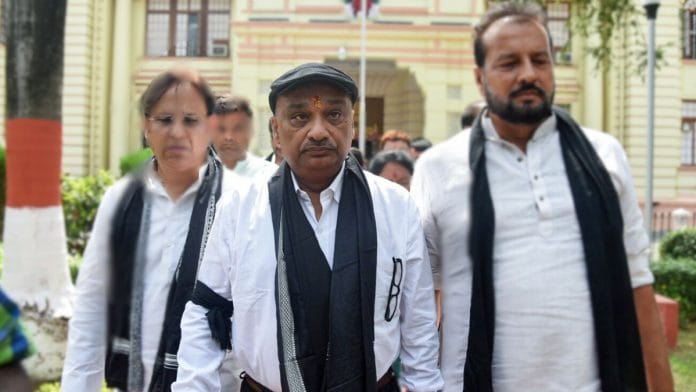New Delhi: The Supreme Court Tuesday outlined guiding principles for courts to consider while scrutinising the action taken by a House against its members.
The guidelines, the court said, are not exhaustive but an indicative framework to enable the judiciary to assess whether action taken against a lawmaker is proportionate to his or her alleged misdemeanor or misconduct during a working session of the House.
A bench of Justices Surya Kant and N. Kotiswar Singh laid down the procedure while setting aside the expulsion of Rashtriya Janata Dal legislator Sunil Kumar Singh from the Bihar House.
Singh was expelled from the state assembly in July 2024 following allegations that he made derogatory remarks against Bihar Chief Minister Nitish Kumar during the proceedings of the House. A motion for his expulsion was passed 13 February 2024, a day after the ethics committee of legislative council submitted its report recommending his removal.
“As soon as the Governor’s address was completed and during the motion of thanks, the Petitioner (Sunil Kumar Singh) and another MLC, Md. Sohaib approached the well of the House and hurled indecent slogans against the Chief Minister,” according to the order.
According to the complaint, Singh was charged with imitating the CM and calling him “Paltu Ram”, an “expert in manipulations”, and “just like a snake sheds its skin every year”.”
Holding that punishment meted out to Singh was “excessive” and disproportionate, the Supreme Court bench found the case a fit one for judicial intervention.
It ordered Singh’s immediate reinstatement, while adding that the period of expulsion already undergone by him shall be deemed as a period of his suspension from the House, which would be sufficient punishment for him.
However, it underscored the necessity for lawmakers to exhibit restraint and maintain decorum in their conduct, given the critical and influential roles assigned to them in political democracy.
Also Read: Delhi court closes dark chapter with life sentence for Sajjan Kumar in 1984 anti-Sikh riots case
The guiding principles
Outlining some “guiding principles” for courts to consider while reviewing a House action against the lawmaker, the Supreme Court said it was necessary because the absence of an “elected representative” from the House disrupts the democratic process and undermines the voice of the electorate.
Extreme punishment such as expulsion, it added, must be handed out only in “exceptional cases and must withstand “judicial scrutiny”.
Courts must consider factors such as the “degree of obstruction caused by the member in the proceedings of the House and whether the behavior of the member has brought disrepute to the dignity of the entire House”, the bench said, adding that The bench said constitutional courts have a duty to review legislative actions if they appear “prima facie” harsh and disproportionate.
“Constitutional courts must assume a crucial role in ensuring that the actions imposing punishment on members are proportionate and just. This is achieved through a structured approach that balances legislative authority with judicial oversight,” the bench remarked.
Among other considerations in the decision-making process, the Supreme Court bench listed the availability of lesser restrictive measures to discipline the delinquent member; whether crude expressions uttered are deliberate and motivated or a mere outcome of language largely influenced by the local dialect; whether the measure adopted is suitable for furthering the desired purpose; and the balance between the interest of society, particularly the electorates, with those of the erring members.
“The balancing of societal interests, particularly those of the electorate, with the disciplinary requirements of the legislature” is also a crucial factor, the court said, adding punishment must not serve as a tool for retribution, but rather to uphold and enforce discipline within the House.
The previous as well as the subsequent conduct of the erring member, such as expressing remorse and cooperating with the institutional scrutiny mechanism, must be considered before the punishment is determined, the bench further said.
Note of caution for judiciary
On Singh’s expulsion, it said, the measure was “grave” and should not have been taken in the normal course.
The bench relied upon a 2007 Supreme Court Raja Rampal vs Lok Sabha speaker ruling to reinforce its proportionality principle. It said severe punitive measures affect not only the members, but also the democratic process, as their absence can hinder “parliamentary discussions and legislative decision-making”.
The primary objective of imposing punishment is to maintain decorum and foster a constructive environment in the House for effective debate and deliberation. “Any punitive measure must be proportionate and guided by considerations of fairness, reasonableness and due process,” the court emphasised.
Along with expounding the measures for legislative action against its erring members, the bench struck a note of caution for the judiciary. It said judicial intervention in legislative matters should not lead to an overreach and that courts must be circumspect before they entertain a petition inviting their attention to an alleged arbitrary exercise of power.
(Edited by Sanya Mathur)






